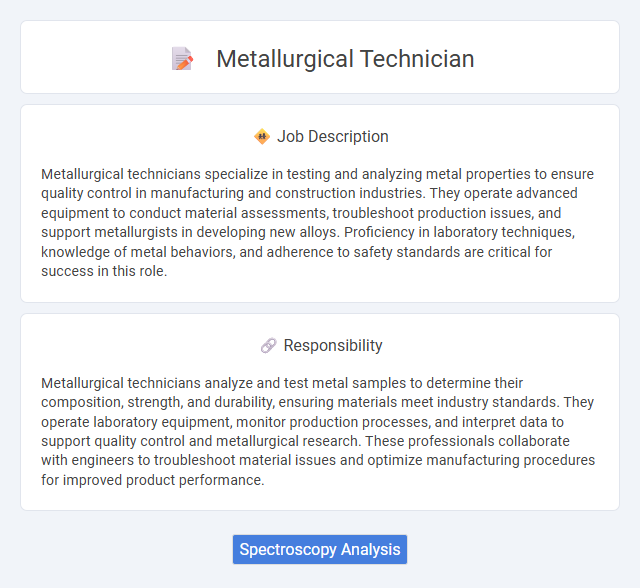
Metallurgical technicians specialize in testing and analyzing metal properties to ensure quality control in manufacturing and construction industries. They operate advanced equipment to conduct material assessments, troubleshoot production issues, and support metallurgists in developing new alloys. Proficiency in laboratory techniques, knowledge of metal behaviors, and adherence to safety standards are critical for success in this role.
Individuals with strong analytical skills and a keen interest in materials science are likely to find a metallurgical technician role suitable, as it demands precision and problem-solving abilities. People comfortable working in lab environments and handling complex tests under strict safety protocols may adapt well to the job's technical and safety requirements. Those who prefer routine or less hands-on tasks might find the physical and detail-oriented nature of metallurgical work less fitting to their strengths.
Qualification
A Metallurgical Technician requires a strong foundation in materials science, typically demonstrated through an associate degree or diploma in metallurgical technology or materials engineering. Proficiency in laboratory techniques, metallurgical testing methods such as hardness testing, microscopic analysis, and mechanical testing, alongside familiarity with quality control standards, is essential. Hands-on experience with metallurgical equipment and software, combined with a solid understanding of metal properties and manufacturing processes, enhances job performance and career advancement.
Responsibility
Metallurgical technicians analyze and test metal samples to determine their composition, strength, and durability, ensuring materials meet industry standards. They operate laboratory equipment, monitor production processes, and interpret data to support quality control and metallurgical research. These professionals collaborate with engineers to troubleshoot material issues and optimize manufacturing procedures for improved product performance.
Benefit
A Metallurgical Technician role likely offers substantial benefits such as competitive salaries and opportunities for career advancement in the materials science industry. Employees may gain access to state-of-the-art laboratory equipment and cutting-edge metallurgical technologies, enhancing skill development. There is also a probability of receiving health benefits and professional training support, improving overall job satisfaction and long-term career growth.
Challenge
Metallurgical technicians likely face challenges involving maintaining precision while analyzing metal compositions and properties. They probably need to troubleshoot complex production issues that affect material quality and durability. Managing evolving technologies and strict safety standards may also pose frequent obstacles in their daily work.
Career Advancement
Metallurgical technicians gain expertise in analyzing metals and alloys, supporting material development, and conducting quality control tests. Advancing in this field often involves pursuing specialized certifications, acquiring skills in advanced analytical techniques, and moving into roles such as metallurgical engineer or quality control manager. Strong knowledge of materials science, proficiency with laboratory equipment, and experience in process optimization enhance career growth opportunities in metallurgy.
Key Terms
Spectroscopy Analysis
Metallurgical technicians specializing in spectroscopy analysis utilize advanced spectroscopic instruments such as atomic absorption spectrometers and X-ray fluorescence (XRF) analyzers to determine the chemical composition and properties of metals and alloys. They prepare samples meticulously, calibrate equipment, and interpret spectral data to ensure compliance with industry standards and optimize material performance. Expertise in spectrometry techniques enhances quality control processes in steel manufacturing, aerospace materials testing, and metal recycling operations.
 kuljobs.com
kuljobs.com